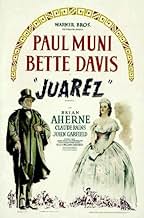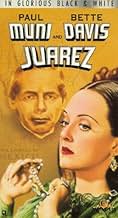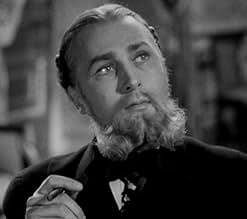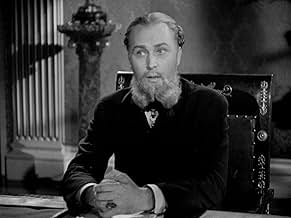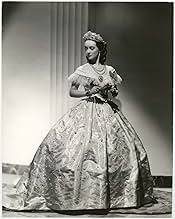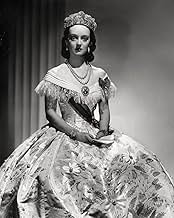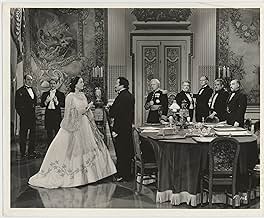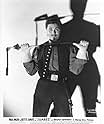IMDb RATING
6.9/10
2.6K
YOUR RATING
Louis Napoleon III (Claude Rains) takes advantage of the American Civil War to circumvent the Monroe Doctrine and expand his power by helping Emperor Maximilian von Habsburg (Brian Aherne) t... Read allLouis Napoleon III (Claude Rains) takes advantage of the American Civil War to circumvent the Monroe Doctrine and expand his power by helping Emperor Maximilian von Habsburg (Brian Aherne) to add Mexico to his empire.Louis Napoleon III (Claude Rains) takes advantage of the American Civil War to circumvent the Monroe Doctrine and expand his power by helping Emperor Maximilian von Habsburg (Brian Aherne) to add Mexico to his empire.
- Nominated for 1 Oscar
- 1 win & 1 nomination total
Storyline
Did you know
- TriviaBecause the film shows a number of Maximilian's generals to be Mexican, many viewers attribute it to typical Hollywood historical distortions. It is, however, indeed accurate. It's a little-known fact that, although Maximilian was eventually overthrown and executed by Mexican revolutionaries, there were more Mexicans fighting on Maximilian's side than against him. This was due in large part to the Catholic Church's strong support of the French occupation of Mexico and its encouraging of Mexican Catholics to fight against the revolutionary forces by joining Maximilian's army, which they did in large numbers.
- GoofsWhen Napoleon III is informed in a letter that Robert E. Lee has been defeated at Gettysburg, he responds by paraphrasing Lincoln's famous Gettysburg Address by calling democracy as government for the people, by the people, etc. He couldn't have known Lincoln's speech flourish because it wasn't given until November 19, 1863, more than four months after the battle.
- Quotes
Emperor Louis Napoleon III: Democracy! Government of the cattle, by the cattle, for the cattle!
- Alternate versionsIn 1952, the film was re-released and several key scenes were removed, particularly sequences that contained dialogue that criticized countries which, in 1939 had been regarded as totalitarian, but which, by the early 1950s had become Cold War allies of the United States and could therefore no longer be criticized as imperialist adventurers. Germany and Italy, especially, former enemies in the 1940s, were now the cornerstone of NATO. The removal of these scenes obfuscated the narrative considerably, in particular, removing any clear reasons behind the execution of the Emperor Maximilian at the conclusion of the film. This revised print runs 106 minutes and is the version released on video and generally available today. The 1939 version is preserved on nitrate stock in the Warner Archive.
- ConnectionsFeatured in Hollywood and the Stars: The Angry Screen (1964)
- SoundtracksMy Country Tis of Thee
(uncredited)
Music attributed to Henry Carey (1744)
Played as part of the score when America is mentioned
Featured review
Juarez is a film that might possibly have been better served if the concept of a mini-series had been available back in 1939. Certainly his story in its entirety with Maximilian and Carlotta as just one part of it would be a mini-series.
Benito Juarez who rose from being an illiterate Zapotec Indian from Oaxaca province in Mexico has developed into the Mexican statesman with the biggest popular appeal in American culture. Note how in the film, he is juxtaposed with Abraham Lincoln. Both men started from very humble background and rose to lead their respective nations at the same time, in times of great crises for their countries.
Paul Muni makes an impassive and stoic Juarez. It certainly is atypical of the rest of his historical characters be it Louis Pasteur, Pierre Radisson, or Emile Zola where he is quite eloquent. It's so different than what you normally see from Muni.
Juarez's story shares the screen with that of his counterpart the Emperor Maximilian. The real Maximilian was not as naive as Brian Aherne would have us believe. He knew very well his power was there while the French army was there. Yet in his own way with limited options he tried to govern as best he could. Aherne was nominated for Best Supporting Actor, but lost to Thomas Mitchell for Stagecoach.
Hollywood usually can't resist a mad act and Bette Davis might have been nominated herself had she not been already nominated for the much better Dark Victory. It really did happen that way, the high strung Carlotta just snapped when she returned to France to get help for her beleaguered husband. She lived in her private mad world for over 60 years, dying in the mid twenties of the next century.
Claude Rains registers well as emperor Louis Napoleon and with this film played both Bonaparte emperors of France. He had played the first Napoleon in Hearts Divided. Marshal Achille Bazaine played well by Donald Crisp was withdrawn with his troops because France was very concerned, rightly so, about a growing threat from a uniting Germany and couldn't waste time with imperialist ventures. I do love the fact that the French seem so concerned about the Monroe Doctrine which was nothing more than an expression of U.S. policy, always has and always will be. It had no force of law behind it, but with the Civil War over and the Union Army at the point of Appomattox being the largest army in the world at that time, that had more to do with Napoleon deciding that the western hemisphere wasn't worth it.
An interesting side note to that retrenchment policy, Louis Napoleon also withdrew French troops from Rome and the Papal States for the same reason at the same time because of threats to the home land. It removed the last block to a uniting Italy as well.
If I have a favorite among the supporting cast it is Joseph Calleia who plays Juarez's slippery Vice President who tries a palace coup d'etat and falls very short.
The one jarring note in the cast is John Garfield who sounds more like he's from the Lower East Side of New York than Mexican as Juarez supporter and future dictator of Mexico, Porfirio Diaz.
Juarez as a film is overly ambitious, it tries to tell too much in the running time allotted. A film about Juarez and a film strictly from the Maximilian/Carlotta point of view would have been far better.
Benito Juarez who rose from being an illiterate Zapotec Indian from Oaxaca province in Mexico has developed into the Mexican statesman with the biggest popular appeal in American culture. Note how in the film, he is juxtaposed with Abraham Lincoln. Both men started from very humble background and rose to lead their respective nations at the same time, in times of great crises for their countries.
Paul Muni makes an impassive and stoic Juarez. It certainly is atypical of the rest of his historical characters be it Louis Pasteur, Pierre Radisson, or Emile Zola where he is quite eloquent. It's so different than what you normally see from Muni.
Juarez's story shares the screen with that of his counterpart the Emperor Maximilian. The real Maximilian was not as naive as Brian Aherne would have us believe. He knew very well his power was there while the French army was there. Yet in his own way with limited options he tried to govern as best he could. Aherne was nominated for Best Supporting Actor, but lost to Thomas Mitchell for Stagecoach.
Hollywood usually can't resist a mad act and Bette Davis might have been nominated herself had she not been already nominated for the much better Dark Victory. It really did happen that way, the high strung Carlotta just snapped when she returned to France to get help for her beleaguered husband. She lived in her private mad world for over 60 years, dying in the mid twenties of the next century.
Claude Rains registers well as emperor Louis Napoleon and with this film played both Bonaparte emperors of France. He had played the first Napoleon in Hearts Divided. Marshal Achille Bazaine played well by Donald Crisp was withdrawn with his troops because France was very concerned, rightly so, about a growing threat from a uniting Germany and couldn't waste time with imperialist ventures. I do love the fact that the French seem so concerned about the Monroe Doctrine which was nothing more than an expression of U.S. policy, always has and always will be. It had no force of law behind it, but with the Civil War over and the Union Army at the point of Appomattox being the largest army in the world at that time, that had more to do with Napoleon deciding that the western hemisphere wasn't worth it.
An interesting side note to that retrenchment policy, Louis Napoleon also withdrew French troops from Rome and the Papal States for the same reason at the same time because of threats to the home land. It removed the last block to a uniting Italy as well.
If I have a favorite among the supporting cast it is Joseph Calleia who plays Juarez's slippery Vice President who tries a palace coup d'etat and falls very short.
The one jarring note in the cast is John Garfield who sounds more like he's from the Lower East Side of New York than Mexican as Juarez supporter and future dictator of Mexico, Porfirio Diaz.
Juarez as a film is overly ambitious, it tries to tell too much in the running time allotted. A film about Juarez and a film strictly from the Maximilian/Carlotta point of view would have been far better.
- bkoganbing
- Jun 10, 2007
- Permalink
- How long is Juarez?Powered by Alexa
Details
- Release date
- Country of origin
- Languages
- Also known as
- Maximilian and Carlotta
- Filming locations
- Warner Ranch, Calabasas, California, USA(Photographs)
- Production company
- See more company credits at IMDbPro
- Runtime2 hours 5 minutes
- Color
- Sound mix
- Aspect ratio
- 1.37 : 1
Contribute to this page
Suggest an edit or add missing content



